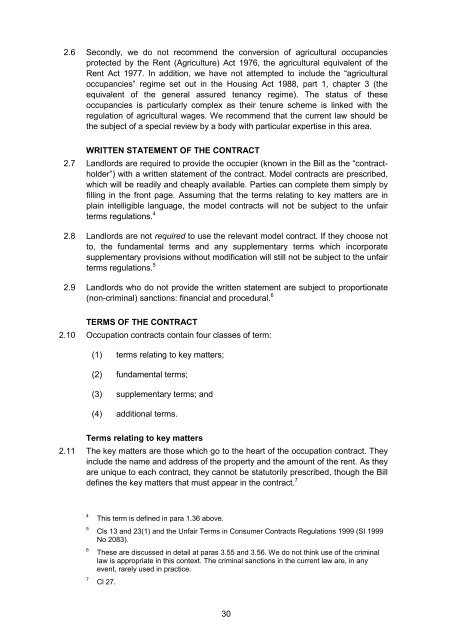Renting Homes: The Final Report - Law Commission
Renting Homes: The Final Report - Law Commission
Renting Homes: The Final Report - Law Commission
You also want an ePaper? Increase the reach of your titles
YUMPU automatically turns print PDFs into web optimized ePapers that Google loves.
2.6 Secondly, we do not recommend the conversion of agricultural occupancies<br />
protected by the Rent (Agriculture) Act 1976, the agricultural equivalent of the<br />
Rent Act 1977. In addition, we have not attempted to include the “agricultural<br />
occupancies” regime set out in the Housing Act 1988, part 1, chapter 3 (the<br />
equivalent of the general assured tenancy regime). <strong>The</strong> status of these<br />
occupancies is particularly complex as their tenure scheme is linked with the<br />
regulation of agricultural wages. We recommend that the current law should be<br />
the subject of a special review by a body with particular expertise in this area.<br />
WRITTEN STATEMENT OF THE CONTRACT<br />
2.7 Landlords are required to provide the occupier (known in the Bill as the “contractholder”)<br />
with a written statement of the contract. Model contracts are prescribed,<br />
which will be readily and cheaply available. Parties can complete them simply by<br />
filling in the front page. Assuming that the terms relating to key matters are in<br />
plain intelligible language, the model contracts will not be subject to the unfair<br />
terms regulations. 4<br />
2.8 Landlords are not required to use the relevant model contract. If they choose not<br />
to, the fundamental terms and any supplementary terms which incorporate<br />
supplementary provisions without modification will still not be subject to the unfair<br />
terms regulations. 5<br />
2.9 Landlords who do not provide the written statement are subject to proportionate<br />
(non-criminal) sanctions: financial and procedural. 6<br />
TERMS OF THE CONTRACT<br />
2.10 Occupation contracts contain four classes of term:<br />
(1) terms relating to key matters;<br />
(2) fundamental terms;<br />
(3) supplementary terms; and<br />
(4) additional terms.<br />
Terms relating to key matters<br />
2.11 <strong>The</strong> key matters are those which go to the heart of the occupation contract. <strong>The</strong>y<br />
include the name and address of the property and the amount of the rent. As they<br />
are unique to each contract, they cannot be statutorily prescribed, though the Bill<br />
defines the key matters that must appear in the contract. 7<br />
4 This term is defined in para 1.36 above.<br />
5<br />
Cls 13 and 23(1) and the Unfair Terms in Consumer Contracts Regulations 1999 (SI 1999<br />
No 2083).<br />
6 <strong>The</strong>se are discussed in detail at paras 3.55 and 3.56. We do not think use of the criminal<br />
law is appropriate in this context. <strong>The</strong> criminal sanctions in the current law are, in any<br />
event, rarely used in practice.<br />
7 Cl 27.<br />
30

















